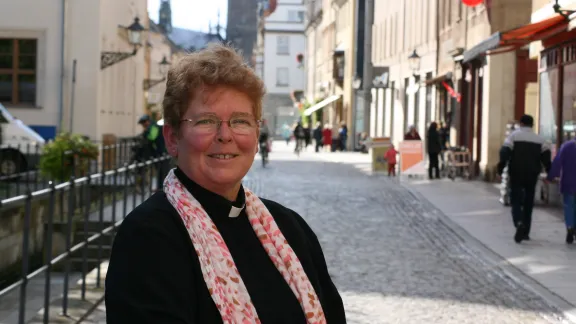
Bishop Barbara Collins (ELCA) at the LWF Retreat of Newly Elected Leaders. Photo: LWF/A.Weyermüller
Bishop Barbara Collins (ELCA) reflects on the Retreat of Newly Elected Leaders
LWI – Barbara Collins (59) was elected Bishop of the Upper Susquehanna Synod – one of 65 synods in the Evangelical Lutheran Church in America (ELCA) – for a six-year term in June. She was installed by ELCA Presiding Bishop Elizabeth Eaton in October 2016. As one of the participants of the Retreat of Newly Elected Leaders that took place in Geneva, Switzerland, and Wittenberg, Germany, from 7 to 16 September, she met with 12 other bishops and pastor presidents from LWF member churches worldwide.
In an interview with the Lutheran World Information she shares insights into the challenges faced by her church, her leadership experiences and insights gained during the Retreat of Newly Elected Leaders.
Bishop Collins, please tell us something about the context you and your church live in.
I am bishop of the Upper Susquehanna Synod, a geographically small area in the Central Northeast territory in the state of Pennsylvania, United States. Many members of our congregations are employed in the manufacturing industry, retail and sales, heath fields, education, or are self-employed. We live in a very rural area so there are many farms scattered throughout our synod territory.
In Pennsylvania, Lutherans make up a significant number of the Christians, but the majority are Roman-Catholic. We have 125 congregations. In my synod, there are 59 active and 59 retired pastors of whom 30 are still serving – we couldn’t do without them. In addition, we have a program for lay leaders - with about 100 participants - which trains lay leaders to lead services and preside over the eucharist with the bishop's authority.
What are some of the major issues you are dealing with in your church?
Our church is shrinking and the average age of church members in our congregations is rising. People are moving out of our area, especially young adults and their families, but also families are getting smaller as fewer children are being born. That automatically means we have fewer members in our traditional constituencies.
Then we have people struggling economically, especially the elderly. They have difficulty making ends meet with the little money they earn. Small farmers are having a hard time competing against large scale farming that puts pressure on the price of agricultural goods. In some areas, our congregations have weekend feeding programs to help support families in need and many of our congregations support their community food pantries.
It is encouraging to see that people who don’t have a lot of money will support the congregation in other ways. One example: When we organize festivities, we often have pot luck or covered dish meals. People bring along a dish they prepared to share with everyone. This form of hospitality and catering works very well. Another way they offer support is by volunteering to do work around the church.
We have become so used to sitting still and listening to sermons – we need to go out and to meet people where they are. Getting to know your neighbor is our challenge today.
One of my tasks is building relationships with many entities of the church. I challenge members to think about being church in new ways. We have become so used to sitting still and listening to sermons – we need to go out and to meet people where they are. Getting to know your neighbor is our challenge today. Many people don’t even know the ones living next door to them. If that is the case, we won’t know if they are safe in a crisis and we don’t know what they are occupied with in their day to day life. Relationships are a key issue.
How did your church commemorate 500 years of Reformation?
There have been numerous, very different activities. During six weeks of Lent there were congregations studying Luther’s Small Catechism. Together with catholic congregations we have been reenacting the Lund Commemoration. Music and concerts have played a significant role. And quite a few people have taken the opportunity to visit Germany and tour Wittenberg. For me personally it is special to come here in this year of Reformation.
What are your personal highlights of the Retreat of Newly Elected Leaders in Wittenberg and Geneva?
It felt like meeting the world – and my world got bigger with it! Meeting people face to face is different from reading about them. We had a strong feeling of connectedness in our group and hope to stay in contact with each other long after this retreat.
What touched me was to hear the stories of sacrifice – also personal sacrifice – that some of the participants shared; and to see the strength of their faith despite the experiences they made. It humbles me when I compare this to arguments and conflicts in my own church.
Also, some issues are now framed in a bigger picture: we heard about people leaving Eritrea, we heard about churches welcoming the stranger in Finland and I see the USA struggling to break down the wall… Once these things are connected to concrete faces they touch you on a much deeper, human level.
I will be able to take home and share these personal stories, the history relived in Wittenberg, and the work of the Lutheran World Federation – the communion of churches and the unity we share. I am honored to have been invited to be a participant of this Retreat of Newly Elected Leaders which has been life changing.


